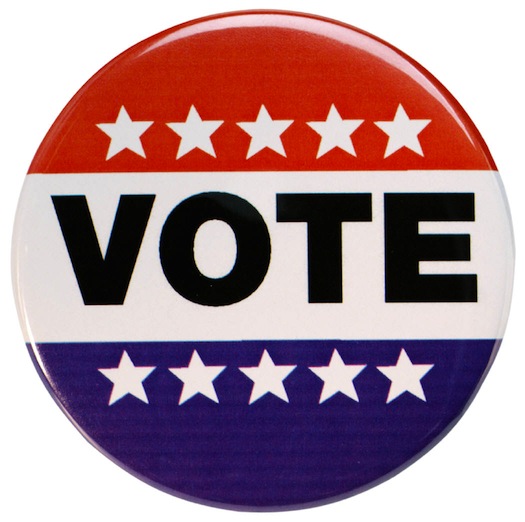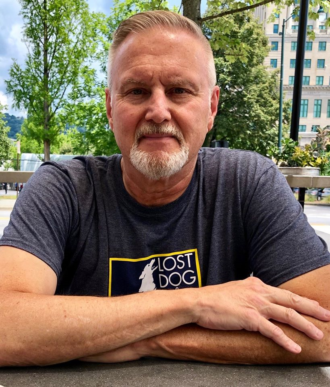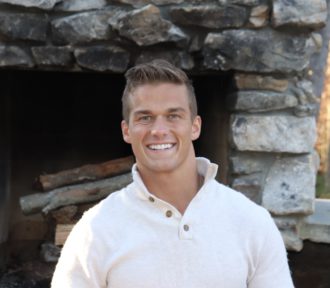By Mark Barrett
Morris “Moe” Davis had hoped to spend this spring roaming Western North Carolina, meeting voters one on one and building a campaign organization able to flip to the Democratic Party the congressional seat recently vacated by Republican U.S. Rep. Mark Meadows.
Instead, the Democratic nominee in the 11th Congressional District is stuck tweeting regularly and spending some time conversing with mountain residents on Facebook, plus keeping track of the bears he often sees near his home in Asheville’s Chunns Cove neighborhood.
“Not a replacement for traditional campaigning,” Davis readily admitted in a telephone interview, “but you’ve got to work with what you’ve got.”
With baby kissing, hand shaking and door knocking out of the question, candidates in key races from Congress to the County Commission are sidelined and struggling to connect — virtually — with voters. Campaigning in the era of COVID has been upended.
A candidate walking neighborhoods to solicit votes these days probably wouldn’t have doors slammed shut in their face only because “I don’t think the door would even open,” said Michael Bitzer, political science professor at Catawba College in Salisbury, N.C.
“The classic notion of campaigning is knocking on doors, grassroots mobilization. That’s unavailable,” Bitzer continued. “Candidates and campaigns have to reimagine engagement and voter-turnout methods in new and different ways.”
Chris Cooper, who teaches political science at Western Carolina University, added that campaign fundraising “is going to be difficult. … One thing you do when you’re fundraising is you’re giving access to the candidate, and right now there’s really no good way to give access.”
In addition, the suddenly weak economy and stock market declines mean potential donors will be less generous, said Larry Shaheen, a Charlotte political consultant who mostly works with Republicans. “You’re going to see a lot of folks struggling to raise money right now.”
Tweeting and Facebooking for votes
The candidates faced most urgently with adapting to the new environment are the two Republicans locked in a June 23 runoff for their party’s nomination to face Davis in the 11th District, which takes in WNC from McDowell County west.
Maggie Valley resident Lynda Bennett, a real estate broker, and Madison Cawthorn, a real estate investor and motivational speaker from Henderson County, emerged atop a field of 12 candidates in North Carolina’s March 3 primary, but neither was able to amass the 30 percent of votes necessary under state law to claim the GOP nomination and avoid a runoff.
Buncombe County Republican Party Chairman Jerry Green said he has seen little evidence of campaign activity by Bennett and Cawthorn recently, describing the race as being “at a standstill.”
Under normal circumstances, Green said, the two Republicans would be attending party gatherings and making appearances around the district. But, he added, “If you got out there and did much now, you’d be viewed as insensitive.”
Cawthorn, in a phone interview, lamented the inability to continue campaigning in the traditional ways. But he said he is pivoting to take full advantage of the digital communication tools to campaign in what he calls the “new town square” where citizens debate and decide issues using social media. The fact that Cawthorn is a millennial is an advantage, the 24-year-old said. “It’s been very easy for me to adapt to this environment because it is the environment that I’ve lived in my entire life.”
He regularly posts campaign videos on Facebook titled “The New Town Square.” One says the United States can come back from the COVID-19 pandemic much like Cawthorn did after a car accident that requires him to use a wheelchair. “We live in the greatest country in the world, and if you have to face a terrible time … there’s no better place to be than the United States of America. Take heart everyone,” he says.
Bennett declined to be interviewed, though she also continues to be active on social media with messages adapted to the COVID-19 environment. Her recent Facebook and Twitter messages include a video ad touting her business experience and saying she “stands with President Trump to beat this sickness. And in Congress, Lynda will work with Trump to hold China accountable.”
She also posted a video of herself holding a military-style rifle and telling viewers, “I’m practicing my social distancing while also exercising my Second Amendment rights, so y’all stay safe.” She then fires three rounds.
Facebooking, singing John Prine and bears
Meanwhile Davis, the Democratic nominee, also has shifted his campaign effort to social media. He began twice-a-week Facebook Live events during which he answers questions from people who tune in. He also tweets, or retweets, criticisms of Trump and controversial Republican actions, such as the Wisconsin GOP’s decision to override the Democratic governor and force polls to open for that state’s primary April 7 despite worries over COVID-19 and a shortage of poll workers.
That’s leavened with a video of Davis, a retired Air Force colonel and lawyer, singing John Prine’s “Angel From Montgomery” to commemorate the singer’s recent death and video of bears lumbering around outside Davis’s home.
The races probably least affected by the slowdown in political activity are such local ones as those for Asheville City Council and Buncombe County Board of Commissioners. There is typically not a lot of visible campaigning in those until summer or early fall.
Incumbent Republican Commissioner Joe Belcher says he is “not campaigning at all right now” to retain his District 3 seat representing southern and western parts of the county.
But largely because of COVID-19, Belcher said the number of questions and requests for help he gets from constituents has tripled and he is focused on dealing with those issues: “I’m on the phone now more than ever.”
His opponent, Democratic nominee Parker Sloan, a manager at a solar power company, said COVID-19 highlights some issues he is talking about in his campaign, such as income inequality, health care and affordable housing. But he said it would be too soon for traditional organized campaign activities now even if there were no pandemic, and his campaigning has largely been limited to conversations with residents via phone or social media.
Taking a breather
Despite the high political stakes, the statewide campaigns to challenge incumbent Democratic Gov. Roy Cooper and incumbent Republican U.S. Sen. Thom Tillis seem to be in a near state of suspended animation. WCU professor Cooper said this reflects a national trend: “We’re taking a little campaign breather like we have not in the last few (election) cycles.”
He said this pause could work against the challengers, who need to overcome the advantages that go to an incumbent, particularly ready access to the news media. As North Carolina’s top executive, Cooper has driven the state’s response to the pandemic and has had ample opportunity to connect with voters through televised briefings and media coverage.
Polling shows that Cooper, like many governors, has seen a significant improvement in his favorability ratings since the crisis began and is showing “solid governing capability,” says Catawba College professor Bitzer.
His GOP opponent, Lt. Gov. Dan Forest, suspended campaign activities in late March including fundraising, according to his campaign manager, Hal Weatherman, although that interval appears to be ending. Weatherman said the Forest campaign recently has given money to people and businesses needing help. And in recent days, Forest has been calling on Cooper to release more data on the pandemic along with a more specific plan on lifting the stay-at-home restrictions.
But Cooper’s higher media profile comes with some risk. Bitzer said that, to the extent problems surface with the state’s response — such as with the speed of sending out unemployment checks and voter restiveness over the pace of reopening — Forest may find fodder to criticize Cooper later in the campaign.
In the U.S. Senate race, incumbent Tillis has held frequent telephone town hall meetings in which he answers constituents’ questions about COVID-19 and related federal actions. Democratic nominee Cal Cunningham, a former state senator and Army veteran, has relied on social media to host conversations and a recent fundraising coffee via Zoom with him from his home kitchen.
Bitzer says Tillis’ reelection prospects may have less to do with his own actions and more to do with the way North Carolina voters view Trump’s response to COVID-19, which is already a topic of heated debate and will probably continue to be throughout the campaign.
“So much of the Senate race may be tied to the top of the ticket,” Bitzer said. “How Donald Trump does may guide how Thom Tillis does.”
When, or even if, the 2020 campaigns can return to traditional forms, remains unknown. That leaves candidates stuck for a while trying to win voters through their digital devices. “It’s a great tool,” District 11 congressional candidate Davis said of social media. “You can reach people and places that you couldn’t otherwise. But it’s not the same as face to face.”
AVL Watchdog is a nonprofit news team producing stories that matter to Asheville and Buncombe County. Mark Barrett is a veteran freelance journalist focusing on Western North Carolina. Contact us at avlwatchdog@gmail.com.
Editor’s note: This story was updated at 3:24 p.m. on April 27 to include updated information about the campaign activities of Republican runoff candidates for the 11th Congressional District.







Before you comment
The comments section is here to provide a platform for civil dialogue on the issues we face together as a local community. Xpress is committed to offering this platform for all voices, but when the tone of the discussion gets nasty or strays off topic, we believe many people choose not to participate. Xpress editors are determined to moderate comments to ensure a constructive interchange is maintained. All comments judged not to be in keeping with the spirit of civil discourse will be removed and repeat violators will be banned. See here for our terms of service. Thank you for being part of this effort to promote respectful discussion.